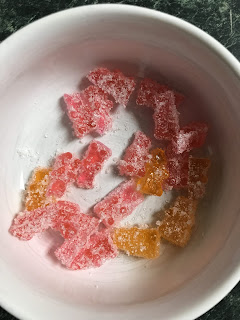Which Sweetener Should I Use?
Zero sugar claims are sweeping the nation!
So often I see food and drink containers that flaunt 0g sugar, No Sugar Added, Zero Sugar, No Refined Sugar or something of the like.
So what are all these products using that make them taste so sweet? Well, sweeteners! There's a laundry list of options that a company could use so you should be in the know about which one is right for you.
I am by NO means the expert on this topic and I encourage you to do further research if this is something that concerns you but I thought I would shed a little light on the subject from my personal knowledge and research.
Artificial Sweeteners
- Sucralose - very commonly found in drinks, packaged foods, protein powder, etc.
- Aspartame - most commonly I have seen it is in diet soda, there have been many claims of negative health effects, yet it is marked safe by FDA and other food regulating agencies
- Ace-K
- Saccahrin
- and more!
Natural Sweeteners
- Stevia/Reb A - one of the most popular, it is derived from the stevia leaf plant but buyer beware, it is often highly processed and blended with other sweeteners for a less bitter aftertaste
- Monk Fruit - derived from the monk fruit plant, look for 100% monk fruit extract
- Xylitol, Maltitol, Erythritol, and Sorbitol - sugar alcohols, technically natural created through a fermentation process. Some can cause digestion problems for some people. Xylitol is known to support dental health and is often found in toothpaste.
- Allulose, tagatose, etc. - derived from some type of sugar if it ends in -ose. Some may cause bloating.
- Honey - has many health benefits including phytonutrients, antibacterial, antioxidants, etc. Raw honey (not heated or processed) contains the most benefits. Also a source of sugar and calories.
- Molasses - byproduct of sugar cane production, contains magnesium, iron and potassium. Also a source of sugar and calories.
- Maple Syrup - low impact on blood sugar levels. Also a source of sugar and calories.
- Coconut Nectar - less sweet than sugar, derived from coconuts.
- IMO Syrup - prebiotic low calorie, low carb sweetener from an enzymatic conversion of starch (VitaFiber IMO is from natural tapioca starch. You can purchase it here: vitafiberimo.com with code: MEGANO20 for a discount)
- Yacon Syrup - extracted from the tuberous roots of the yacon plant, can help lower blood glucose but should still be monitored for diabetics as it does contain sugar
- natural cane sugar, coconut sugar, date sugar - more natural forms of sugar, source of calories and sugar
Whew! So many options! Many people choose to steer away from artificial sweeteners due to possible negative health effects, however, there is much controversy over this. I think they are probably fine in limited quantities though I prefer natural sweeteners when possible. Some sweeteners are still newer to the market, such as allulose, so keep in mind that we may not know everything there is to know about these. They may come from a natural source but they are not in their natural state.
Hopefully, you can find the sweeteners that work best for your health and goals! My first choice is usually pure stevia. I find erythritol is good for baking but, in large quantities, it causes me digestive issues. I also love maple syrup, honey and Vitafiber for liquid sweeteners!
Do you use sweeteners? Do you pay attention to sweeteners in what you eat?


Comments
Post a Comment